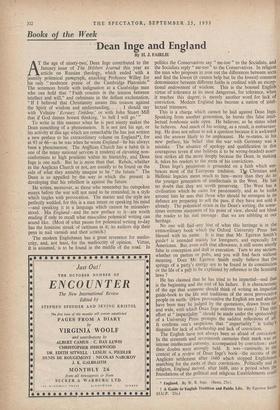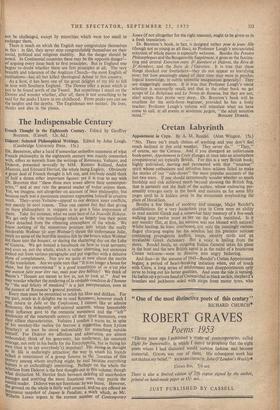Books of the Week
Dean Inge and England By H. J. FAIRLIE T the age of ninety-two: Dean Inge contributed to the January issue of The Hibbert Journal this year an article on Russian theology, which ended with a jauntily polemical paragraph, attacking Professor Wiley for his only " moderate praise of the Cambridge Platonists." The sentences bristle with indignation at a Cambridge man who can hold that " Faith consists in the tension between intellect and will," and culminate in the defiant exclamation, " If I believed that Christianity means this treason against the Spirit of wisdom and understanding, . . . I should say' with Voltaire ' Ecrasez l'infame,' or with John Stuart Mill that if God damns honest thinking, ' to hell I will go.' " To write in this manner when he is past ninety makes the Dean something of a phenomenon. It is not just his age, or his activity at this age which are remarkable (he has just written a new preface to his extraordinary volume on England*), for at 93 or 66—as he was when he wrote England—he has always been a phenomenon. The Anglican Church has a habit (it is one of the many national services it renders) of elevating non- conformists to high positions within its hierarchy, and Dean Inge is one such. But he is more than that. Rebels, whether in the Anglican Church or not, are usually to be found on the side of what they amiably imagine to be " the future." The Dean is so appalled by the way in which the present is developing that his rebellion is against the future.
He writes, moreover, as those who remember his outspoken essays before the war will not need to be reminded, in a style which tingles with provocation. The matter and the style are perfectly wedded, for this is a man intent on speaking his mind —and speaking it in a language which cannot be misunder- stood. His England—and the new preface to it—are worth reading if only to recall what masculine polemical writing can sound like. (Most of what passes for polemical writing to-day has the feminine streak of cattiness in it; its authors dip their pens in nail varnish and then scratch.) The modern Englishman has a great reverence for medio- crity, and, not least, for the mediocrity of opinion. Virtue, it is assumed, is to be found in the middle of the road. In politics the Conservatives say " me-too " to the Socialists, and the Socialists reply " me-too to the Conservatives. In religion the man who proposes to iron out the differences between sects and find the lowest (it cannot help but be the lowest) common denominator between different faiths is credited with an excep- tional endowment of wisdom. This is the boasted English virtue of tolerance at its most dangerous, for tolerance, when it' reaches this degree, is merely another word for lack of conviction. Modern England has become a nation of intel- lectual trimmers.
This is a charge which cannot be laid against Dean Inge. Speaking from another generation, he bursts this false intel- lectual bonhomie wide open. He believes; so he states what he believes. And much of his writing, as a result, is embarrass- ing. He does not refuse to ask a question because it is awkward and the answer likely to be unplea‘sant. He re-states, in his new preface, his belief that the war with Germany was a mistake. The absence of apology and quilification in this courageous (even if one believes it to be wrong-headed) asser- tion strikes all the more deeply because the Dean, in making it, takes his readers to the roots of his convictions.
Dean Inge's pessimism is grounded on a faith which ern- -braces most of the European tradition. TV Christian and Hellenic legacies mean much to him—more than they do to the younger generation of intellectuals in the West. He has no doubt that they are worth preserving. The, West has a civilisation which he cares for passionately, and as he looks around him he sees that those who should be strongest in its defence are preparing to sell the pass, if they have not sold it already. The polemical strain in the Dean's writing, the some- times extreme statement of his point of view, should not blind the reader to his real message : that we are nibbling at our heritage. No one will find .any hint of what this heritage is in the extraordinary book which the Oxford University Press has blessed with its name It is true that Mr. Egerton Smith's guide t is intended mainly for foreigners, and especially for Americans. But, even with that allowance, it still seems utterly false in conception and dull in execution. Turn to any section, whether on parties or pubs, and you will find facts without meaning. Does Mr. Egerton Smith really believe that the springs of a party's energy are to be found in its constitution or the life of a pub to be explained by reference to the licensing laws ?
He has claimed that he has tried to be impartial—and that is the beginning and the end of his failure. It is characteristic of the age that someone should think of writing an impartial guide-book to the life and traditions of the most provocative people on earth. (How provocative the English are and always have been may be judged by the quotations, drawn from far and wide, with which Dean. Inge enlivens his essay.) That this effort at " impartiality " should be made under the sponsorship of a University Press prompts the saddest reflections of all It confirms one's suspicions that " impartiality " is today's disguise for lack of scholarship and lack of conviction. The English have not always been so afraid of conviction. In the sixteenth and seventeenth centuries their mark was all intense intellectual curiosity, accompanied by conviction : even their doubts were strongly held. It was—curiously, in the context of a review of Dean Inge's book—the success of the Anglican settlement after 1660 which stopped Englishmen searching for the roots of their convictions. Politically and in religion, England moved, after 1688, into a period when the, foundations of the political and religious Establishments could
* England. By W. R. Inge. (Henn, 25s.).
t A Guide to English Tradition and Public Life. By Egerton Smith. (O.U.P. 21s.) not be challenged, except by minorities ,which were too small to endanger them.
There is much on which the English may congratulate themselves in this : in fact, they never stop congratulating themselves on their social, political and religious stability. But the danger should be noted. In Continental countries there may be the opposite danger'— of arguing every issue back to first principles. But in England one begins to doubt whether there are first principles at all. The very breadth and tolerance of the Anglican Church—the most English of institutions—has all but killed theological debate in this country.
As a Scot, it has been one of the great delights of my life to fall in love with Southern England. The Downs offer a peace which is not to be found north of the Tweed. But sometimes I stand on the Downs and wonder whether, after all, there is not something to be said for the peaks I knew in my childhood. From peaks you can see the heights and the depths. The Englishman sees neither. He lives, thinks and dies in the plains.



































 Previous page
Previous page